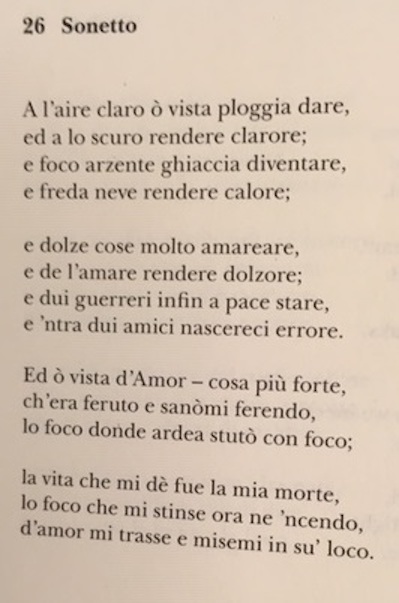I’ve seen it rain on sunny daysAnd seen the darkness flash with lightAnd even lightning turn to haze,Yes, frozen snow turn warm and brightAnd sweet things taste of bitternessAnd what is bitter taste most sweetAnd enemies their love confessAnd good, close friends no longer meet.Yet stranger things I’ve seen of loveWho healed my wounds by wounding me.The fire in me he quenched before;The life he gave was the end thereof,The fire that slew eluded me.Once saved from love, love now burns more.Translation by Leo Zoutewelle.

They drew inspiration from troubadour poetry of Occitania written in langue d’oc, which applied the feudal code of honor to the relationship between a man (acting as the vassal) and a woman (acting as king or superior). This represented a reversal of the traditional roles of women in Medieval Society, who had been considered dependent on men. It reflected a change in medieval society: the decline of feudalism and the rise of the middle class led to a shift in the reading public. The epic, traditionally focused on great military pursuits, gave way to the lyric, which generally centered on love. In the later Middle Ages, more and more women started reading books, and poetry tried to adapt to their point of view and their newly acquired role in society.

This Occitan poetry became highly influential in Italy. However, the Sicilian School differed from the troubadours by introducing a kinder, gentler portrayal of women compared to their Occitan models, resembling Dante’s madonnas and Petrarch’s Laura. The Sicilian style and language established the first Italian literary standard by enriching the existing vernacular base with new Latin and Provençal styles and words.
The importance of the poetic forms passed down by the Sicilian School cannot be overstated. The canzone became a standard form for Italian poets for centuries, and the Sicilian-school sonnet, with variations, became the dominant poetic form not only in Renaissance Italy but also elsewhere in Europe, particularly in Elizabethan England, where it was modified to create the distinctive English, or Shakespearean, sonnet.
Frederick successfully established the first modern state in Europe, run by an efficient bureaucracy. Its members were neither appointed from the aristocracy nor the clergy, as the former were more interested in preserving their privileges than the welfare of the country and often plotted against him to regain power, while the latter remained loyal to the Pope, his biggest adversary.
In fact, Frederick dismantled the feudal system of government inherited from the Normans. His magna curia and minor dignitaries were typically chosen from lay orders, much like his poet-notaries. He also eliminated internal barriers, enabling free trade that brought prosperity to the South and made Bari one of the wealthiest cities in the Mediterranean, as witnessed by Cielo in his Contrasto. This modern state deprived his barons of the ability to collect taxes, their primary source of revenue. This centralization of power required Frederick to continually relocate his court within his domains to establish law and order.
Giacomo Da Lentini, also known as Jacopo Da Lentini, is traditionally credited with the invention of the sonnet, and his works in that form remain the earliest known. He adapted the themes, style, and language of Provençal poetry to Sicilian, infusing it with his aristocratic and exclusive tastes. All his extant poetry, including some 40 lyrics like sonnets, canzoni, tenzoni (poetic debates), and one discordo (poetic disagreement), revolves around the theme of love, which, in the courtly tradition, is viewed in feudal terms as the lover’s service to his lady. Unfortunately, little of his poetry survives in the original Sicilian dialect and has mostly been modified to conform to Tuscan.
(The above adapted from Wikipedia, Encyclopedia Brittanica and other sources)
